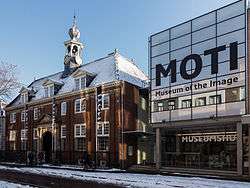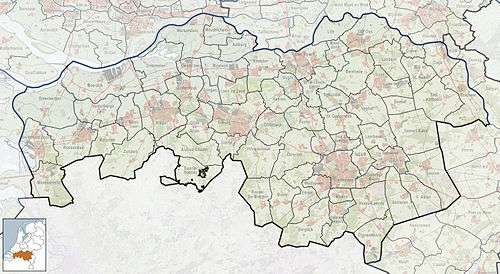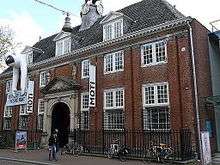Stedelijk Museum Breda
The Stedelijk Museum Breda, formerly the Museum of the Image (MOTI), is a national museum for visual culture in Breda in the Netherlands. The museum focuses on film, design, photography, fashion, visual arts, architecture, science, and gaming.
 Museum in 2013 | |
 Location in North Brabant in the Netherlands | |
| Former name | Graphic Design Museum |
|---|---|
| Established | 1 January 2008 |
| Location | Boschstraat 22 Breda, Netherlands |
| Coordinates | 51.5896°N 4.7811°E |
| Type | Museum for visual culture National museum[1] |
| Visitors | 40,000 (2012 est.)[2] |
| Director | Mieke Gerritzen[3] |
| Website | stedelijkmuseumbreda |
MOTI closed from 1 January 2017 with the intention of reopening the building in spring 2017 as Stedelijk Museum Breda, a merger with Breda's Museum.[4]
History
Netherlands has been home to many internationally renowned designers including Piet Zwart, Willem Sandberg, Wim Crouwel and Anthon Beeke. The Graphic Design Museum offers an international podium for established designers and new talent.
On January 1, 2008, The Beyerd became an independent organisation and was known as the Graphic Design Museum Beyerd Breda. The official reopening took place on June 11, 2008 in a dedication presided over by Queen Beatrix. On 9 December 2011 is the name of the museum changed in Museum Of The Image (MOTI).
The current director of the museum is artist/designer Mieke Gerritzen.
The museum has a partial 1963-1980 archive of the Total Design on loan (long-term) from the NAGO. The Graphic Design Museum is also Research institute, and has a shop, a café and an auditorium. Furthermore, the museum publishes its very own Museum Magazine, and has an education program for both Elementary schools as well as Academic Colleges.
On 9 December 2011 the museum changed its name to Museum Of The Image (MOTI).[5]
Building

MOTI is housed in one of the oldest buildings in Breda. Mention is first found of it in the archives of 1246 as a hospice in Breda. The function of a hospice at the time was to provide care and shelter to pilgrims and other strangers. The De Beyerd building lay just outside the built-up area on the road which led to Den Bosch. There was a city gate near to De Beyerd, which was known as the Hospice Gate. In 1956 it became a cultural centre, the Beyerd. Between 1980 and 2005 it remained a centre for the illustrative art, especially modern art.
The building has been a national heritage site (rijksmonument) since 1966.[6]
Activities
Besides the prominent exhibitions, the Graphic Design Museum also organizes multiple activities like tours, workshops and children's parties.
Children can become designers in the museum and publish with various forms, colours, materials, signs and pictograms. Adults and young people get deeper insight into the past and present of the image culture and are brought up to date with the newest developments in visual communication.
References
| Dutch Rijksmonument 10106 |
- (in Dutch) De leden van de VRM, Vereniging van Rijksmusea. Retrieved on 20 December 2014.
- (in Dutch) Wijnand Nijs, "MOTI richt blik op Vlaanderen en financiers", Breda Vandaag, 2013. Retrieved on 12 December 2014.
- Organisation Archived 2014-12-13 at the Wayback Machine, Museum of the Image. Retrieved on 12 December 2014.
- "Stedelijk Museum Breda" Stedelijk Museum Breda, Accessed 12 January 2017.
- "Graphic Design Museum Breda is niet meer" (in Dutch). bredaVandaag.nl. 2011-11-28. Retrieved 2012-02-14.
- (in Dutch) Monumentnummer: 10106, Rijksdienst voor het Cultureel Erfgoed. Retrieved on 12 December 2014.